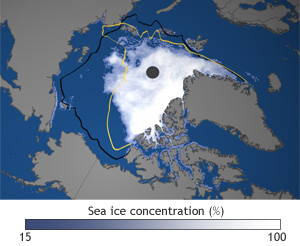Please note: Osher Rainforest will be closed for maintenance Jan. 14–16.
Science News
Weekly News Round-Up
December 7, 2012

This week’s science news round-up includes follow-ups to previous Science Today stories and videos.
Arctic Report Card
This week NOAA released their annual Arctic Report Card, announcing the news at the AGU Meeting. (We produced a video about the 2010 report card.) Jane Lubchenco, head of NOAA, was present, as were several dozen international scientists who contributed to the report.
No surprise. According to the report, we’re seeing a significantly changing Arctic. The presenters mentioned some news we covered earlier this year, including phytoplankton blooms under sea ice and the record low for this year’s summer sea ice. The report also covers the high melting rate of the Greenland ice sheet and the overall effects of melting on terrestrial and marine animals in the region.
“If not already there, we are well on our way to seeing a new Arctic,” Lubchenco said. “And since the Arctic is not isolated, and an integral and vital part of global ecosystem, it will have consequences on rest of planet.”
Climate Change and Civilizations
Last month, we reported on findings of the effect of climate change on the Maya civilization. And this week at the AGU meeting, two scientists reported similar findings for other past civilizations including the Persian and Sumerian. Read more at the Huffington Post.
Clean Energy Challenges
About a year ago, we introduced the new, more efficient technology for charging electric cars. And this week, KQED Quest offers an audio report on the very real and difficult challenges of charging these cars in our great state.
In 2010, it seemed that connecting offshore wind power was right around the corner. We posted two stories about the possibilities of this clean, renewable energy in our country (here and here). This week, the Green blog in the New York Times reports that offshore wind installations are still not a reality in the US and costs are rising in Europe to build these turbines and install them in deep waters.